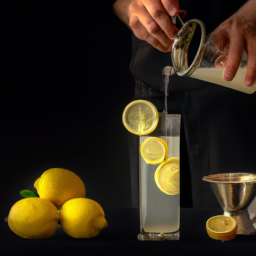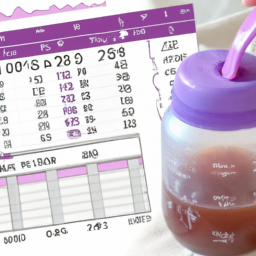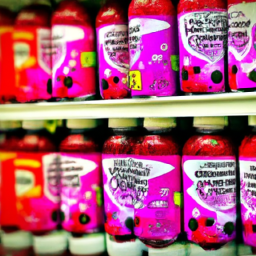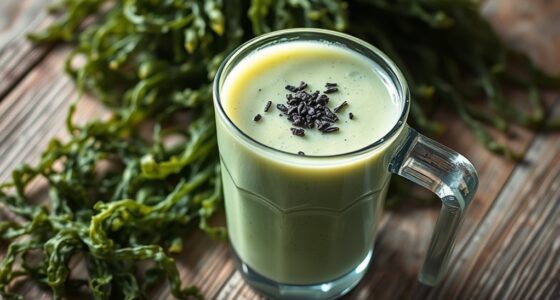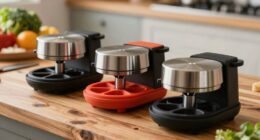For orange juice enthusiasts, having a constant supply of fresh juice is essential. However, freezing the juice allows you to enjoy it whenever you want. Freezing fresh orange juice is a great way to extend its freshness, ensuring you always have a healthy and refreshing drink on hand.
In this article, I’ll walk you through the steps for freezing fresh orange juice. We’ll start by discussing how to choose the right oranges, and then move on to gathering supplies and preparing the fruit. From there, I’ll show you how to juice the oranges and store the juice properly. Finally, I’ll provide tips for thawing and using the frozen juice, as well as some troubleshooting advice to ensure that your frozen orange juice is always delicious and refreshing.
So let’s get started!
Key Takeaways
- Valencia oranges are best for juicing and should be firm and heavy.
- Remove outer layer of skin before juicing and store in glass containers with airtight lids.
- Frozen orange juice can last up to 6 months at 0°F or below and can be used in recipes.
- Taste test to ensure freshness and adjust with sugar, water, or salt; label and store in appropriate containers.
Choosing the Right Oranges
You’ll want to make sure you’re picking the juiciest oranges you can find for freezing your fresh orange juice! When choosing the right oranges for your juice, it’s important to consider the variety and the seasonal availability.
Valencia oranges are a great choice for juicing because they have a high juice content and are available from March to September. Navel oranges, on the other hand, are best for eating as they have a lower juice content and are in season from November to April.
When selecting oranges, look for ones that are firm and heavy for their size. Avoid oranges that are soft or have blemishes, as they may not be as juicy.
Once you’ve gathered your oranges, it’s time to move on to the next step of gathering supplies for freezing your fresh orange juice.
Gathering Supplies
Like a chef preparing for a meal, it’s important to gather all the necessary supplies before starting the process of freezing fresh orange juice. Here are the supplies needed:
-
Juicer: A juicer is essential for extracting the juice from the oranges. Manual and electric juicers are both available in the market, so choose the one that best fits your needs.
-
Freezer-safe containers: You will need containers that are safe to use in the freezer. Glass jars or plastic containers with tight-fitting lids are great for this purpose.
-
Strainer: A strainer will help you remove any pulp or seeds from the juice before freezing.
-
Measuring cup: A measuring cup will help you get the right amount of juice and ensure consistency in your recipe.
Once you have gathered all the necessary supplies, it’s time to get started on the preparation steps. First, wash the oranges thoroughly and dry them with a clean towel.
Then, cut the oranges into halves or quarters, depending on the size of your juicer. With the juicer ready, extract the juice from the oranges and strain it to remove any pulp or seeds.
Now that you have fresh orange juice, it’s time to move on to the next step of preparing the oranges for freezing.
Preparing the Oranges
Get ready to transform those juicy oranges into a deliciously refreshing beverage by preparing them for the juicer.
The first step is to select oranges that are ripe and juicy with a bright orange color. It’s important to choose oranges that are heavy for their size, as this indicates that they’re full of juice. Avoid oranges that are soft or have blemishes, as they may not produce the best quality juice.
Once you’ve selected your oranges, it’s time to clean them thoroughly. Wash each orange under running water, scrubbing gently with a brush to remove any dirt or debris. Dry the oranges with a clean towel and then use a vegetable peeler to remove the outer layer of skin. Be careful not to remove too much of the white pith, as this contains important nutrients and can also add a bitter taste to the juice.
Now that your oranges are clean and prepared, it’s time to move on to juicing them.
Juicing the Oranges
Now that I’ve prepared the oranges for freezing, it’s time to juice them.
There are two primary methods to juice oranges: using a juicer or using a blender. Using a juicer is the most efficient way to extract the juice, while using a blender is a more time-consuming method that can yield a thicker and pulpier juice.
Using a Juicer
To utilize your juicer for preparing fresh orange juice for freezing, you’ll want to begin by thoroughly washing and cutting your oranges into manageable pieces. Once your oranges are prepped, it’s important to clean and maintain your juicer to ensure the freshest and cleanest juice possible.
Make sure to read the manufacturer’s instructions for cleaning your specific juicer, as each one may have slightly different requirements. When using your juicer, it’s important to feed the orange pieces in slowly and steadily to avoid overloading the machine and potentially causing damage.
Additionally, be sure to empty the pulp container frequently to prevent it from overflowing and affecting the quality of your juice. Once you’ve finished juicing all of your oranges, pour the juice into a container and proceed to the next step of freezing or blending.
Speaking of blending, if you don’t have a juicer available, don’t worry – you can still make fresh orange juice by using a blender.
Using a Blender
Blending oranges in a blender is a quick and easy way to enjoy fresh orange juice. To start, I recommend using a high-speed blender to achieve a smooth consistency. Begin by peeling and segmenting the oranges. Remove any seeds and place the segments into the blender. Add a small amount of water to help with blending, and blend on high until the juice is smooth and frothy.
After blending, it’s important to clean and maintain the blender to keep it in good working condition. Rinse the blender immediately after use with warm water and a mild detergent. Take care not to immerse the base of the blender in water. Use a soft brush to clean the blades and the bottom of the blender. Wipe the blender dry with a clean cloth.
Regular maintenance of the blender will ensure that it lasts for a long time. Now that the juice is blended, let’s move on to the next step of storing the juice.
Storing the Juice
When it comes to storing fresh orange juice, choosing the right containers is crucial to maintaining its quality and freshness. I recommend using glass containers with airtight lids, as they’re non-reactive and won’t affect the flavor of the juice.
Labeling and dating the containers is also important to keep track of the shelf life and ensure that you consume the juice before it goes bad.
Choosing the Right Containers
First things first, you’ll want to make sure you have the proper containers to freeze your fresh orange juice. When choosing the right containers, there are a few factors to consider.
Firstly, you’ll need to decide between glass and plastic containers. Glass containers are more durable and can be reused multiple times, but they’re also more prone to breaking. Plastic containers, on the other hand, are lightweight and less likely to break, but may not be as durable and may need to be replaced more frequently.
Another factor to consider is whether you want to use reusable or disposable containers. Reusable containers are a more eco-friendly option and can be used multiple times, but they may require more cleaning and sanitizing. Disposable containers are convenient and require no cleaning, but they’re not environmentally friendly.
It’s also important to choose the proper sizes of containers depending on the amount of juice you plan to freeze. When selecting containers, be sure to properly clean and sanitize them before use to prevent any potential contamination.
When you have chosen the right containers for your fresh orange juice, the next step is to properly label and date them.
Labeling and Dating
To make sure you always know what you have in your freezer, it’s important to label and date your containers. This simple step can save you from confusion and potential waste. When labeling your frozen orange juice, make sure to include the date it was frozen and the amount of juice in the container. This information will help ensure that you use the oldest juice first and that you know how much juice you have left.
It’s also important to understand the shelf life of frozen orange juice and how to preserve it properly. When stored at 0°F or below, frozen orange juice can last up to 6 months. However, to maintain the best quality and flavor, it’s recommended to use it within 3-4 months. To preserve your orange juice, make sure to remove as much air as possible from the container before freezing. This can be done by filling the container as close to the top as possible without overflowing and then pressing a piece of plastic wrap directly onto the surface of the juice before sealing the container. With these preservation techniques and proper labeling, you can enjoy fresh-tasting orange juice all year round. Next, we will discuss the process of actually freezing the juice.
Freezing the Juice
Once you’ve squeezed the fresh orange juice, simply pour it into a freezer-safe container and pop it in the freezer. Freezing is one of the best ways to preserve the juice’s nutrients and flavor.
Frozen orange juice can last up to six months in the freezer without losing its taste and nutritional value. Moreover, it’s an excellent way to have fresh orange juice on hand anytime you want it.
There are several benefits of frozen orange juice. First, it’s a great way to save time and money. You can freeze orange juice in bulk and have it ready for use whenever you need it. Second, frozen orange juice can be used in various ways, such as making smoothies, cocktails, or marinades. It can also be used as a substitute for fresh orange juice in recipes.
Now that you’ve frozen the juice, let’s move on to the next step, which is thawing it.
Thawing the Juice
Are you wondering how to bring that delicious frozen treat back to life? Thawing your orange juice is easy and quick, so you can enjoy its refreshing taste in no time! There are several methods to thaw frozen orange juice, but the best ones are either in the refrigerator or by running warm water over the container. The time frame for these methods is usually 24 hours in the refrigerator or 30 minutes under warm water.
The table below illustrates the best methods and time frame for thawing your frozen orange juice:
| Method | Time Frame |
|---|---|
| Refrigerator | 24 hours |
| Warm water | 30 minutes |
Now that your orange juice is thawed, it’s time to test it to make sure it’s still fresh and tasty.
Testing the Juice
Before consuming frozen orange juice, I always make sure to check for its freshness and taste. To determine its freshness, I examine the color and consistency of the juice, as well as any signs of mold or spoilage. I also taste a small amount to ensure that it hasn’t gone bad.
Checking for these two key factors is important to ensure the safety and quality of the juice.
Checking for Freshness
Ah, nothing quite compares to the sweet tang of fresh-squeezed orange juice. But before you go freezing it for future use, make sure to give it a good sniff and a taste to ensure it hasn’t gone all funky on you. Checking for freshness is an important step in preserving the quality of your juice. There are different methods of preservation, but freezing is the most common one. However, it’s important to note that freezing doesn’t stop the degradation process, it only slows it down. Therefore, it’s crucial to make sure your juice is fresh before freezing it.
To check for freshness, there are a few things to look out for. The table below outlines the signs of fresh and spoiled orange juice:
| Fresh Orange Juice | Spoiled Orange Juice |
|---|---|
| Bright color and clear | Cloudy or opaque |
| Smells fresh and citrusy | Rancid or sour smell |
| Sweet and tangy taste | Bitter or metallic taste |
| Within expiration date | Past expiration date |
Make sure to check for these signs before freezing your orange juice. If it passes the freshness test, you can safely freeze it for future use. However, if it fails, it’s best to consume it immediately or discard it. Now that you know how to check for freshness, let’s move on to the next step of checking for taste.
Checking for Taste
Before freezing fresh orange juice, it’s important to assess its freshness. However, checking for freshness isn’t enough as taste is equally important. Taste testing is crucial to ensure that the orange juice meets your flavor preferences.
When it comes to taste testing, there are several factors to consider. Firstly, the sweetness level of the juice should be just right, not too tart nor too sugary. Secondly, the acidity shouldn’t be overwhelming and should complement the sweetness. To ensure that the juice is flavorful, you can add a pinch of salt to enhance the taste. Lastly, it’s important to note the aftertaste, as it shouldn’t be bitter or unpleasant.
To achieve the perfect flavor for your frozen orange juice, it’s important to understand your taste preferences. Whether you prefer a sweeter or more sour taste, taste testing allows you to make adjustments before freezing the juice. Once you’ve established the ideal taste, you can move on to the next step of freezing the juice.
Using the Frozen Juice
Once the frozen orange juice is thawed, you can enjoy a refreshing glass of OJ anytime! But did you know that using frozen orange juice in recipes can be just as beneficial? By freezing fresh juice, you can preserve the nutrients and natural flavors while avoiding any added sugars or preservatives found in pre-made juices. This allows for a healthier option when cooking or baking with orange juice.
When using frozen orange juice in recipes, it’s important to remember to thaw the juice completely before use. This can be done by placing the frozen concentrate in a bowl of warm water or in the refrigerator overnight. Once thawed, the juice can be easily added to recipes such as marinades, salad dressings, baked goods, and even cocktails. The possibilities are endless and the taste will be far superior to using pre-made juice.
So, let’s move on to some tips for success when freezing fresh orange juice.
Tips for Success
For optimal results, it’s best to preserve the natural flavors and nutrients of fresh orange juice by using the correct containers and freezing it for the optimal amount of time.
When selecting containers for freezing, it’s important to choose ones that are airtight and can withstand freezing temperatures. Glass jars or plastic containers with tight-fitting lids are ideal for preserving the taste and quality of the juice.
The optimal freezing time for fresh orange juice is between 6-8 months. Freezing for longer periods of time can cause the juice to lose its flavor and nutritional value.
It’s important to label the containers with the date that the juice was frozen, so it can be used within the recommended time frame.
By following these tips, you can ensure that your frozen orange juice retains its delicious taste and nutrients for months to come.
Frequently Asked Questions
How long can frozen orange juice be stored for?
I store frozen orange juice for up to six months in the freezer. The shelf life of frozen orange juice can vary depending on the storage temperature and packaging. Properly stored frozen juice maintains its quality and taste.
Can you freeze orange juice in glass containers?
Freezing orange juice in glass containers has pros and cons. While glass is non-permeable and keeps the juice fresh longer, it’s not recommended due to the risk of breakage. The best containers for freezing orange juice are plastic or freezer-safe bags.
Can you add sugar or other sweeteners to the orange juice before freezing it?
Wow, adding sweeteners to frozen orange juice is a game-changer! The best ways to sweeten fresh orange juice for freezing include using honey, agave, or simple syrup. Just mix in your desired sweetener before freezing for a delicious treat anytime.
Can you freeze orange juice that has pulp in it?
Freezing pulp filled orange juice can be tricky. First, pour the juice into an airtight container, leaving some space for expansion. Freeze for up to 8 months and thaw in the fridge for best results.
Is it safe to freeze orange juice that has been left out at room temperature for a few hours?
No, it is not safe to freeze orange juice that has been left out at room temperature for a few hours. The freezing process may not kill all bacteria, leading to potential foodborne illness. Additionally, it may negatively affect the taste.
Conclusion
Overall, freezing fresh orange juice is a simple and convenient way to ensure that you always have tasty and nutritious juice on hand. As I’ve mentioned in this article, it’s important to choose the right oranges, gather the necessary supplies, prepare and juice the oranges, and store the juice properly.
By following these steps, you can ensure that your frozen juice tastes just as good as freshly squeezed juice.
One interesting statistic that I came across during my research is that frozen orange juice sales in the United States have been steadily declining over the past few decades. In 1998, frozen orange juice sales in the US were at an all-time high of 1.4 billion liters. However, by 2018, that number had dropped to just 520 million liters.
Despite this decline in popularity, freezing fresh orange juice is still a great way to preserve the taste and nutrients of fresh oranges. By using the tips and techniques outlined in this article, you can easily freeze your own fresh orange juice at home.

